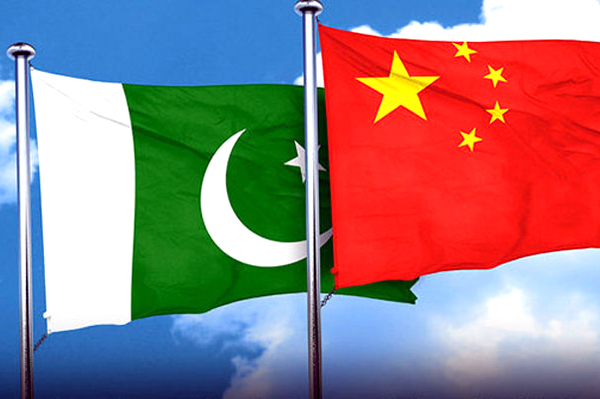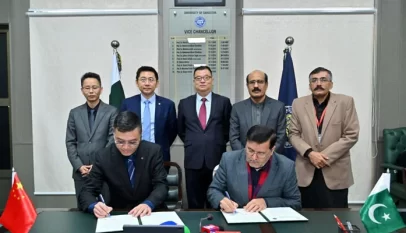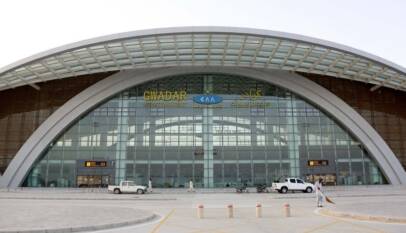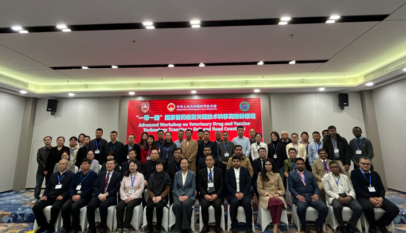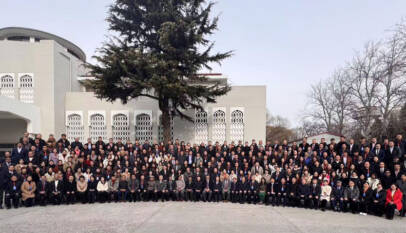China, Pakistan commit to high development of CPEC at 10th JCC meeting
Speaking to media exclusively, Chinese Ambassador to Pakistan, Nong Rong highlighted the success of the 10th Joint Coordination Committee (JCC) meeting, held last week. He said both Pakistan and China have agreed to develop a Joint Working Group on Information Technology Industry, and also signed an MoU to this effect. He said this will particularly help the high-quality development of CPEC. Ambassador Nong also said that in the coming months, Pakistan and China will work jointly for the timely completion of all ongoing projects, and especially those that can ensure socio-economic development of people. He also highlighted that more than 40 companies have registered for investment in Gwadar, whereas transit trade through the Gwadar Port to Afghanistan has been progressing smoothly. Giving details about future projects, he mentioned Gwadar Women Employment Development Center, and North Free Zone will soon help the common man, especially the people of Balochistan. While talking about the future, Ambassador Nong highlighted that the two countries will cooperate in the mining sector as well. Overall, he said 75,000 people have been employed so far, whereas local labor is being trained as well.
Chinese Ambassador to Pakistan Nong Rong says the China-Pakistan Economic Corridor (CPEC), being a pilot project of the Belt and Road Initiative, benefits Pakistan’s national development and realises its transformation from geopolitics to geo-economics. In an interview with Daily Times, the ambassador spoke about the recent meeting of the JCC and achievements and challenges of the CPEC.
Q1: The 10th meeting of the JCC of the CPEC, which was highly anticipated by all walks of life, is finally successfully held. Could you please brief the JCC?
Nong Rong: Pursuant to the consensus reached by the leaders of China and Pakistan on promoting and developing the China-Pakistan Economic Corridor (CPEC), the 10th meeting of the JCC was held via video link on September 23, 2021. The meeting was co-chaired by Mr. Ning Jizhe, Vice Chairman of the National Development and Reform Commission (NDRC) of the People’s Republic of China, and Mr. Asad Umar, Minister for Planning, Development & Special Initiatives of the Islamic Republic of Pakistan. The two sides reviewed and summarized the cooperation since the 9th JCC meeting and agreed that CPEC has achieved important early harvest targets and is entering a new development stage, reached important consensuses on deepening cooperation in the fields of industry, agriculture, social economic, science and technology, and signed the minutes of this JCC. The JCC has played an important leading role in the high-quality development of the CPEC. The two sides will be committed to the smooth operation of the completed projects, solidly promote the projects under construction, and actively carry out new cooperation.
In the 10th JCC meeting, both sides established Joint Working Group on Information Technology Industry and signed Memorandum of Understanding on Establishing Joint Working Group on Information Technology Industry between the Government of the People’s Republic of China and the Government of the Islamic Republic of Pakistan. This will vigorously promote the cooperation between China and Pakistan in the information technology industry and inject new momentum into the high-quality development of the CPEC.
In the 10th JCC meeting, Chief Minister of Balochistan province, Chief Minister of Khyber Pakhtunkhwa province, Chief Minister of Sindh province, Chief Minister of Punjab province, Prime Minister of Aj&K, Chief Minister of Gilgit-Baltistan were all present and each made a speech, which demonstrates that supporting CPEC construction is national consensus across Pakistan.
The two sides will continue to firmly advance the development of CPEC, ensure in-time completion of those projects under construction, focus on economic and social development, job creation and improvement of people’s livelihood, and further strengthen cooperation in Specialized Economic Zones, infrastructure, science and technology, medical treatment and public health, agriculture, and human resources training, with the aim to continuously unleash the great potential of CPEC to make it a hub of regional connectivity. Both sides agreed on comprehensively building the health, industrial, trade, digital, and green corridors.
Q2: Gwadar Port is the leading project of the CPEC. How does the 10th meeting of the JCC evaluate the cooperation of Gwadar Port? What is the current progress of Gwadar Port?
Nong Rong: Gwadar Port is the pilot project of the CPEC and is known as the jewel in the crown of the CPEC. Since 2013, both China and Pakistan have worked hand in hand on port operations, free zone development, and transportation infrastructure, and completed a series of social and livelihood projects. The achievements made today can be recognized as the “Speed of Gwadar”.
The 10th meeting of the JCC expressed satisfaction on the progress of Gwadar Port and Free Zone, and made plans for the next step in the construction of Gwadar Port. The current development situation of Gwadar Port is very gratifying. The port is getting busier and transit trade to Afghanistan is running smoothly. The government is actively considering arranging more cargo to arrive in and be processed through the Gwadar Port. The port operator COPHC is cooperating with China’s Ningbo Zhoushan Port Group to improve the port operations. All investment promotion work in the starting zone of the Free Zone has been completed. More than 40 companies have invested and registered, and some of them have completed plant construction and started trial production. The Pak-China Products Exhibition Center is progressing smoothly. The main work of the East Bay Expressway project is expected to be completed this year, the New Gwadar International Airport and Pak-China Vocational and Technical Institute at Gwadar are progressing smoothly, the construction of North Free Zone, Chemical Fertilizer Factory, Expo Building, Animal Vaccination Factory, Lubricant Factory has started, and the Tissue Plant Lab has been inaugurated. All these will help develop Gwadar’s port industry and create a future regional trade hub, so that Gwadar can better play its economic radialization role in Balochistan, Pakistan and the region.
In terms of social-economic and people’s livelihood projects, the Solar Generators Aid MoU for the 5,000 sets of solar generators aided by the Ministry of Ecology and Environment of China and the implementation agreement of desalination plant with the capacity of 5,000 tons per day have been signed, which will promote the development of social-economic and people’s livelihood in Gwadar.
Q3: What new developments of the JCC that is worth paying attention to in other fields?
Nong Rong: The China-Pakistan Economic Corridor has continuously enriched its connotations. Now it has established ten working groups including Long Term Plan, Gwadar Port, energy, transport infrastructure, industry, society and socio-economic, agriculture, science and technology, security cooperation, international cooperation and coordination. The progress of cooperation in various fields is gratifying. For example, in terms of energy, the two countries agreed to strengthen top-level design, promote exchanges and cooperation in energy planning, skills training, etc., formulate development plans for the Pakistani oil and gas industry, and accelerate construction of Kohala and Azad Pattan Hydropower projects, Thar Block-1, Thar Block-1 and other important projects. Pakistan expressed its commitment to maintaining policy stability and market regulation. In agriculture, the two sides have proposed a cooperative action plan covering eight aspects; in terms of science and technology, the two countries will continue to implement the science and technology innovation action plan and make continuous progress in the joint construction of joint laboratories, construct science and technology parks, and technology transfer. JCC has made positive statements about the ML-1 railway upgrading project and the N50(D.I.Khan-Zhob) highway project. I believe that more achievements under CPEC will be made in the future.
Q4: The CPEC has successfully entered its second phase of execution. In this particular phase, what opportunities the multi-billion-dollar initiative will bring for the prosperity of the common people of Pakistan, especially the downtrodden communities of the under-developed province of Balochistan.
Nong Rong: The China-Pakistan Economic Corridor is a pilot project of the Belt and Road Initiative that covers the entire territory of Pakistan and serves regional connectivity. CPEC not only benefits Pakistan national development, but also benefits local provinces and local people, and help Pakistan realize its transformation from geopolitics to geoeconomics. CPEC is currently in a new stage of high-quality development, and the next step will focus on cooperation in the fields of industry, socio-economic, and agriculture. By advancing the construction of industrial parks such as the Gwadar Free Zone and Rashakai, it will deepen industrial cooperation to help Pakistan attract foreign investment, help Pakistan accelerate its industrialization process, enhance Pakistan’s capacity to earn foreign exchange through exports, and create more job opportunities for local people. Take the starting area of the Gwadar Free Zone as an example. The garment factory has already started production and a large number of female workers have been hired to work. The Gwadar Women Employment Development Center has also been put into operation. The North Free Zone, of which the construction is started, is 36 times larger in area than the starting area, and is already a good destination for investment, and will bring remarkable development opportunities and social benefits to Balochistan. In agriculture, China will jointly with Balochistan research and promote soil improvement, support the development of local livestock and fishery processing industries, and help local people improve labor productivity and increase their income. We will also make good use of the social economic cooperation mechanism to help Pakistani people improve their quality of life through projects in flexible education, agriculture, medical care, vocational training, etc. In mining cooperation, China and Pakistan have existing mineral cooperation projects in Balochistan, and there is potential to deepen mining cooperation in the future.
Q5: Industrialization is the main pillar of CPEC initiative under which multiple special economic zones will be set up along the corridor. With severe lack of education and skills among youth of Gwadar and Balochistan due to decades of deprivation, how would the illiterate and unskilled youth be able to benefit from the industrial revolution triggered by CPEC?
Nong Rong: Pakistan is the sixth most populous country in the world, with abundant human resources and large numbers of young people, which are conducive to promote industrialization for Pakistan. Nowadays, the urgent problem is how to transform demographic dividend into talent dividend.
The China-Pakistan Economic Corridor is actively creating job opportunities to local people, employing 75,000 people at the peak. The projects of CPEC help Pakistan employees improve their vocational skills hand by hand through different methods including on-the-spot teaching and training.
Besides, a large number of Pakistan youths are recommended and arranged to study and get training in China, which helps Pakistan train a group of talents in the fields of infrastructure and energy. In 2020, 18 outstanding Pakistani staff of CPEC projects were awarded.
In the next stage, the construction of CPEC will continue to advance simultaneously with the training of Pakistani talents, strengthen cooperation with the National Vocational and Technical Training Commission of Pakistan, provide education facilities to all vocational education and training centers in Pakistan through social economic cooperation of CPEC. Pak-China Vocational and Technical Institute at Gwadar is under construction and has been capped. After completion, it will provide more skill training and employment opportunities for local youth. There are some training opportunities for China-Aid projects in Balochistan province. Even in the COVID-19 pandemic, these projects also provide online training opportunities to local people.
Q6: Agriculture is considered the backbone of Pakistan’s economy and most of the rural population in the country relies on farming for their livelihood. How CPEC will help transform this sector to develop it on modern lines so that lives of a huge rural population of Pakistan could be changed.
Nong Rong: Agriculture and industry are currently the areas that Pakistan is most concerned about, and they are also the most promising areas for China-Pakistan cooperation. Rapid progress in agricultural cooperation has been made, mainly in three aspects: first, strengthening mechanisms. Last year, an agricultural working group under the framework of the CPEC joint Commission was set up. The first task of the working group was to help Pakistan fight against locust plague, which achieved remarkable results. Second, the process of exporting agricultural products to China has been accelerated. The inspection and quarantine procedures of Pakistani agricultural products exported to China, including Onions, potatoes, cherries and dairy products, have been stepped up. This year, a protocol on onion export to China will be signed. Pakistan has established a foot-and-mouth disease free zone. The third is to promote investment. This year, with efforts made by our Embassy, China and Pakistan established an information platform on agricultural and industrial cooperation to promote all-round exchanges and cooperation among government, industry, academia and research institutes. Chinese enterprises also plan to invest and cooperate with Pakistan in pepper planting, buffalo milk industry development, food processing and agricultural machinery.
Q7: Security has always been a matter of critical importance to the success of CPEC. How do you see the current security environment in Pakistan, especially in Khyber Pakhtunkhwa and Balochistan provinces through which most of the corridor passes?
Nong Rong: Based on more than 40 years of experience in reform, opening-up and development, China always believes that a country’s development cannot do without a secure and stable environment. China always supports Pakistan’s efforts in safeguarding its national security and fighting against terrorism. We appreciate that Pakistani government and military have provided assured security to CPEC. The Dasu terrorist attack on July 14 and the Gwadar East Bay Expressway terrorist attack on August 20 caused casualties to both China and Pakistan. The leaders and governments of our two countries attach great importance to these incidents. We strongly condemn acts of terrorism and will not waver our resolution for closer China-Pakistan cooperation. Both China and Pakistan are victims of terrorist attacks. We should work closely together to bring the perpetrators to justice as soon as possible, give an answer to the peoples of the two countries, and effectively prevent similar incidents from happening again. China looks forward to working with Pakistan to promote enhanced full-process security measures and upgraded security cooperation mechanisms to ensure the security of Chinese personnel, projects and institutions in Pakistan, and attract more Chinese and foreign investors to invest in Pakistan with safe and stable business environment.
Q8: In the face of complex international environment, the CPEC has been in the eye of international propaganda since its launch. How do you see Pakistani media’s role in neutralizing the negative propaganda being hatched by the enemies of Pakistan and China and what steps would you like to propose to effectively counter the propaganda launched by the vested interests?
Nong Rong: Ever since its inception, CPEC has attracted the wide attention of domestic media of Pakistan and foreign media. At the crucial time for Pakistan to face its development challenges, CPEC has brought to Paksitan $25.4 billion investment with which 46 projects have been completed or are under construction. Consequently, we see in Pakistan an increase of 5200MW power, 886km national backbone transmission line and 510km expressway. All these are substantial investment and efforts. Those who are unwilling to invest money, manpower, time and emotion to the national development of Pakistan simply are not entitled to find faults with CPEC without any cost. Though China’s cultural tradition advocates more deeds with less remarks, we firmly oppose arbitrary attacks and slanders against CPEC. We have no doubt that Pakistani friends will not be misguided and blinded by the false propaganda, because the Pakistani people are wise enough to tell those who are offering actual help, real investment and efforts from those who are driving wedges between China and Pakistan with idle hands. The International Cooperation and Coordination Working Group under the CPEC has successfully promoted several countries to hold seminars to have more people learn about the real CPEC and its great potential for cooperation. As CPEC is now advancing towards high quality development, it will surely bring more opportunities to Pakistan, better promote the sustainable development of its economy, and thus win firmer support from the Pakistani people and foreign friends.
Pakistani, Chinese varsities sign MoU to boost partnership in education sector
Islamabad: Universities in Tianjin, China, have signed three Memorandums of Understanding …



